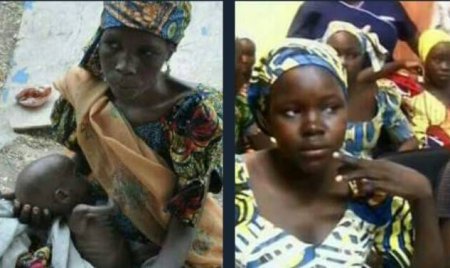P
ProfRem
Guest
Nigerians are posing a critical question over the look and how healthy the 82 newly freed Chibok girls compared to their counterpart freed in October 2016.
On Saturday, Boko Haram militants released 82 schoolgirls out of a group of more than 200 whom they kidnapped from the northeastern town of Chibok three years ago in exchange for prisoners, the presidency said on Saturday.
President Muhammadu Buhari also received the girls on Sunday eveing in the capital Abuja, before jetting out of the country.
In a picture below, Nigerians are comparing how life it is, for the people in various IDP camps in the country and those new set of girls released by the insurgent group.

In its recent survey, the NOIPolls revealed that vast majority of IDPs in the North-East lack access to food, potable water and healthcare.
The analysis shows that almost 9 in 10 IDPs (85 percent) do not have access to quality food and regular meals, about 8 in 10 IDPs (78 percent) do not have access to potable water, while almost 7 in 10 IDPs (69 percent) lack access to quality healthcare.
These results represented a general overview of what is happening in both official and unofficial camps, across Borno, Yobe and Adamawa states.
Related: Why The 82 Freed Chibokgirls Are Chubby – Femi Adesina
On Saturday, Boko Haram militants released 82 schoolgirls out of a group of more than 200 whom they kidnapped from the northeastern town of Chibok three years ago in exchange for prisoners, the presidency said on Saturday.
President Muhammadu Buhari also received the girls on Sunday eveing in the capital Abuja, before jetting out of the country.
In a picture below, Nigerians are comparing how life it is, for the people in various IDP camps in the country and those new set of girls released by the insurgent group.
In its recent survey, the NOIPolls revealed that vast majority of IDPs in the North-East lack access to food, potable water and healthcare.
The analysis shows that almost 9 in 10 IDPs (85 percent) do not have access to quality food and regular meals, about 8 in 10 IDPs (78 percent) do not have access to potable water, while almost 7 in 10 IDPs (69 percent) lack access to quality healthcare.
These results represented a general overview of what is happening in both official and unofficial camps, across Borno, Yobe and Adamawa states.
Related: Why The 82 Freed Chibokgirls Are Chubby – Femi Adesina


